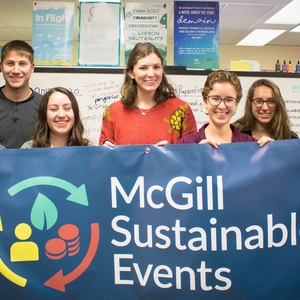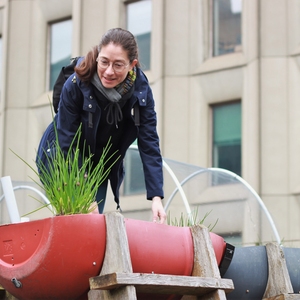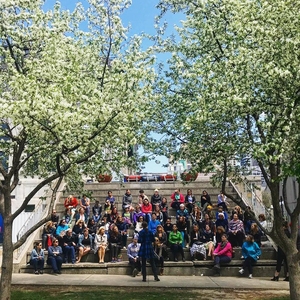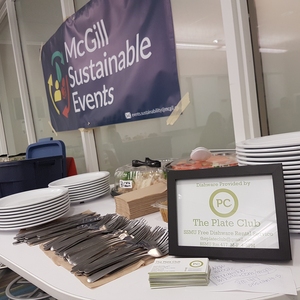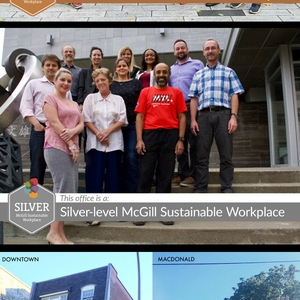The McGill Staff Engagement Ladder
McGill University
Project Overview
Between 2016 and 2019, the McGill Office of Sustainability developed four separate engagement programs to increase collective sustainability actions for staff, students, and faculty. The programs were strategically developed to move beyond the usual suspects, strengthen and forge relationships, and build on successes to implement more impactful and ambitious changes at McGill. Students and faculty were stakeholders throughout the entire project, but we found that staff members had the highest opportunity for impact because of the lack of previous targeted programming for employees. As the four programs were launched, we began to notice increasing synergies among our programs. Many staff members become involved in one program, and then increase their engagement in the others, bringing along their teams and deepening their daily commitment to sustainability.
The ladder of engagement is a framework often used by political and community organizations to offer multiple ways to get involved, in order to deepen an individual’s commitment and capacity toward a goal. Starting from the bottom, the “rungs” of the ladder require increasing levels of commitment. We have identified new ways to integrate the ladder of engagement concept into our programs, and now have many inspiring examples of an individual becoming a champion to lead their unit toward institutional change.
Starting with individual actions and working up to systemic change, McGill offers four sustainability engagement programs: - Staff Gardens: teams of 3 or more staff care for a garden bin in a centralized location - Sustainable Events: a team of student volunteers offer certification, resources, and training to event planners - Sustainable Workplace Certification: 75% or more colleagues commit to levels of environmentally and socially responsible behavior change in their space - Unit Level Action Plan (ULAP): departments crowd-source a sustainability strategy related to their context, operations and mission
Together, this suite of programs provides McGill staff in particular with easy ways to incorporate sustainability into their daily tasks, while providing a clear path for more ambitious changes in their unit. Within two years, our programs have meaningfully engaged with nearly 1,000 members of the McGill community, many of whom are staff who have committed to more than one program.
Background
McGill has world-class sustainability researchers and a thriving student engagement culture on campus, with over 40 sustainability related clubs & faculty associations. However, until 2017 there was no formal way for the 3,000+ McGill staff members to get involved with sustainability on campus. The following programs were developed individually to provide access points for staff interested in sustainability:
Staff Gardens: Container gardening plots are free and available during the summer to teams of 3 or more staff in a unit. The teams are provided soil, compost, water supply, and tools. Staff are given an orientation session and a specific plot, and must commit to take care of their seedlings all summer.
Sustainable Event Certification: A large number of events are hosted at McGill, but previously there was no formal list of sustainability suggestions, resources, or recognition for progress. An interactive toolkit and multi-pronged certification process was developed by 2 students and later institutionalized by our office. Our events program provides training, resources, incentives, and specialized recommendations by a team of trained student volunteers. Unlike most other universities, the checklist also includes items related to social sustainability (e.g. saying traditional Indigenous land acknowledgement, communicating physical accessibility of space, choosing a diversity of speakers, etc).
Sustainable Workplace Certification: Many other universities have a similar green office program, but most focus solely on environmental actions. Our Sustainable Workplace Certification Program includes social sustainability by including actions such as taking a lunch break, learning more about mental health resources on campus, and attending an equity training. The certification program requires at least 75% of an office team to commit to specific behavioral changes, starting with the first level (Bronze) and working their up to the fourth level (Platinum). To finalize the certification, offices submit a photo of the team and receive a printed certificate. The Office of Sustainability promotes the achievement on social media, newsletter, and website.
To create the program, we formed a multi-stakeholder working group to develop the process and checklist actions, including representatives from facilities management, undergraduate student society, equity office, disabilities office, and student services. Along with the checklist, we developed a monthly Staff Sustainability Network learning community and resources (e.g. posters, list of sustainable office suppliers, email templates, waste sorting video, etc).
**Unit-Level Action Plans (ULAP): ** In tandem with our campus-wide Climate & Sustainability Action plan, the sustainability office works with other units across campus to write their own action plans aligning with their unique contexts and challenges.
Before jumping into writing sustainability strategies, our sustainability strategist sit down with the unit to create a plan for broad and meaningful consultation. We begin all consultations by determining a “Sustainability Mission Statement”, outlining the unique contributions that unit can make to sustainability on campus. After that, we brainstorm and select specific actions the unit will take, weighing feasibility, impact, and support. These strategies differ from the sustainable workplace certification, as they target the operations of the unit, as opposed to the behaviors of the employees.
Goals
Goals of linking the 4 programs: • Reach individuals who are new to sustainability involvement • Provide easy and accessible ways to become involved with sustainability on campus • Create new sustainability champions and partners for future projects • Leverage existing champions’ enthusiasm and dedication to propel initiatives • Harness individual passion to move towards collective action • Create fun team-building experiences that will increase uptake in future participation • Strengthen participants’ understanding of the nuanced elements of social and environmental sustainability • In addition to typical environmental goals, increase sense of community & social sustainability (inclusivity, diversity, mental health, social cohesion)
By offering our programs in a supportive, positive manner and considering a wide breadth of sustainability, we have significantly increased the number and variety of people meaningfully engaged with sustainability on campus.
Implementation
Each program intentionally links to the others in various ways:
Garden The Staff Gardens target staff members who don’t necessarily think of themselves as sustainability champions, but feel connections to nature and a sense of community. Through conversations with other gardeners, they begin to make the link with sustainability. They are encouraged to move to other sustainability actions through: • Description of other programs included in garden intake and end-of-season emails • Informal lunch and learns in the garden include a discussion on how gardeners often like the environment but lack concrete ways to apply changes in their lives. • Requiring at least 3 colleagues to sign up as a garden team, which naturally facilitates future collaboration • The diversity of gardening teams from different units across campus, who are given a first point of contact with our office and programs
Sustainable Event Certification The Sustainable Event Certification targets event planners who have noticed or received feedback about the immense amount of waste generated by events, but don’t have the expertise or resources to address it alone. They are encouraged to deepen their sustainability commitments though: • The badge of certification level providing internal and external recognition and motivating people to achieve higher levels eventually • Going through event checklist and expanding their definition of sustainability from purely environmental to more complex social sustainability concepts • Introducing participants to various resources and sustainability organizations on campus • Establishing a positive point of contact with different units, which is helpful when we want to collaborate on other projects
Sustainable Workplace Certification The Sustainable Workplace Certification targets employees who are passionate about sustainability in their own lives, and are looking for ways to share this enthusiasm with their colleagues. The certification directs teams towards further engagement through: • Checklist awards points for getting an event certified • Bonus points promoting participation in other engagement programs • Monthly Staff Sustainability Network learning community includes topics of other initiatives happening on campus (e.g. ULAPs, sustainable events, air travel, waste management, etc.) • Provides natural segue from sustainable workplace to ULAP (moving from everyday actions to structural changes)
Unit-Level Action Plans Unit-Level Action Plans targets key decision makers across campus, who are passionate about sustainability but do not have the time or expertise to facilitate changes in their operations. Many of the units who have signed on to these strategies did so after participating in one or more of the other engagement programs offered by the office of sustainability. For those that did not get involved through the ladder of engagement, the action plans can go full circle, but including actions such as joining the garden, certifying an event as sustainable, achieve a certain workplace certification level, etc.
Timeline
2016 August 2016: Staff position created to develop and coordinate sustainability engagement programs
2017 March – August 2017: Sustainable Event Toolkit and Certification Process Developed April- May 2017: Staff gardens idea developed and space secured, staff gardens launched with 35 participating units May 2017: First events certified as sustainable: French Language Conference, Convocation, Ophthalmology Conference, and Town Hall. August 2017: Sustainable Event Intern position created to support events and workplace certification programs September 2017: 8 student Sustainable Event Consultant volunteers recruited and trained to certify events on campus
2018 January 2018: Sustainable Workplace Certification program and monthly learning community launched February 2018: Unit-Level Action Plan program administrator hired November 2018: First Unit-Level Action Plans launched
2019 March 2019: 20th Sustainable Workplace Certification achieved April 2019: 100th sustainable event certified May 2019: Staff garden plots expand to accommodate for 50 participating units
Financing
For all programs, the main cost is staff time. The professional staff time required to run engagement programs equals about 40 hours of work per week, split between two people’s portfolios. The Sustainable Event intern works on average 10 hours per week to coordinate the event certification program.
Unless otherwise stated, all funding comes from the operational budget of the Office of Sustainability.
Sustainable Event Certification Program Development: - $8,000 was provided from the McGill Sustainability Projects Fund to pay 2 part-time students and 1 website developer for about 6 months. External website costs are approximately $50 per year.
Action Plan Implementation Costs: - This will vary based on the ambition of the plan. Most units thus far have used the McGill Sustainability Projects Fund, or their own operating budget (range: $0-$10,000). Staff time to develop and implement the strategy should also be taken into consideration, but is difficult to calculate.
Reoccurring costs: - $50 per year for food for volunteer appreciation - $50 per year to replace garden equipment. Soil and compost is provided by in-kind donations from another unit. - $100 per year in Sustainable Event and Sustainable Workplace outreach materials (banner, postcards, business cards)
Results
Our suite of engagement programs have effectively expanded our team’s depth and breadth of involvement from the McGill community. By using the concept of the ladder of engagement, we have successfully guided individuals from simple, individual sustainability actions to broad operational changes for their unit.
An example of how the ladder of engagement has been successful is a unit within the Faculty of Medicine. A long-time staff member signed up for a garden with her team in 2017. Through a discussion at the garden, she was introduced to the Sustainable Workplace Certification program and was able to quickly get buy-in from her team. She attended many of the Staff Sustainability Network learning community sessions and was integral in providing feedback for the program. Later when her unit was organizing an anniversary event, she worked with our team to receive the Bronze level of the Sustainable Event Certification. A few months later when it was time to plan another event, she committed to even more environmentally and socially responsible actions, and the event received Silver.
Another example of a unit who climbed the ladder of engagement is Campus Life and Engagement. Our office first contacted them to gauge their interest in other sustainability campaigns in early 2018. Although they were hesitant to the campaigns, they were open to the idea of going through the Event Certification for their biggest orientation event. Sharing their Silver certification on social media received extraordinary positive feedback, which motivated them to participate in more of our sustainability programs. They successfully developed a Unit Level Action Plan, which included a commitment to receive Bronze Workplace Certification. This process allowed us to identify new champions, and sustainability has become a core value for the unit.
Our engagement programs have been quite successful because we have harnessed people’s individual passion and helped shape it into collective action. The results of our individual programs are as follows.
Staff Gardens since May 2017: - Over 20 units participating for 2 or more years - Over 300 total gardeners since May 2017 - Built capacity and connections to many other unis we had never previously engaged with (e.g. Faculty of Music administrators, Faculty Management Career Advising Centre, IT Communications) - About 25% of the certified workplaces were first introduced to our program by getting to know us at the garden
Sustainable Event Certification since May 2017: - 140 total events certified - 20 students have been trained as event consultants - 24,000 total event participants - Over 40,000 water bottles avoided - 43% events committed to compost food waste
Sustainable Workplace Certification since January 2018: - 23 certified offices, including: Office of the Dean of Students, Faculty of Law Admissions, Teaching and Learning Services, Department of Bioresource Engineering - Over 300 individuals in currently certified offices - Over 80 members of the Staff Sustainability Network learning community, with 40% of members attending at least one session
Unit Level Action Plans since March 2018: - 4 completed, 4 in progress - 50% of units with action plans were previously involved in one of the other engagement programs - 65% of unit-level action plans include actions to participate in other engagement programs - +250 community members consulted to date - The existing plans include 48 broad actions, and 109 specific deliverables
Lessons Learned
-
Think about the ladder of engagement during the design stage of the suite of programs. It is helpful to think about how your program can interest or resonate with different possible audiences. Having a range of ways for people to interact provides people options so they can choose the level that is most interesting and appropriate for them (individual, requires team, requires institutional changes to be made).
-
Including diverse stakeholders from the beginning strengthens the scope of sustainability. Including social dimensions of sustainability allows the program to resonate with those who may not immediately connect with environmental projects but who care deeply about equity, mental health, or positive work environments.
-
Start with small wins and provide support and resources to those embarking in the program. Having a good first experience with a sustainability program will likely increase open-ness to participate in other community efforts.
-
Listen: Engaging with the community will often bring out concerns that may not be a priority for you, but working on them is important to the community. For example, encouraging staff to pursue the Sustainable Workplace certification led to feedback of McGill’s waste management weaknesses and demands for institutionalized compost collection. Although this was not in the Office of Sustainability’s original priorities, receiving many common complaints led to a new Sustainability Project Fund position to overhaul the waste infrastructure and streams.
-
Never underestimate the power of a champion! Most of these units succeeded because 1 or 2 people dove in head first and committed. These champions kept things moving when enthusiasm began to wane, they recruited new supporters every step of the way, and they weren’t afraid to take risks and be bold in their commitments.

